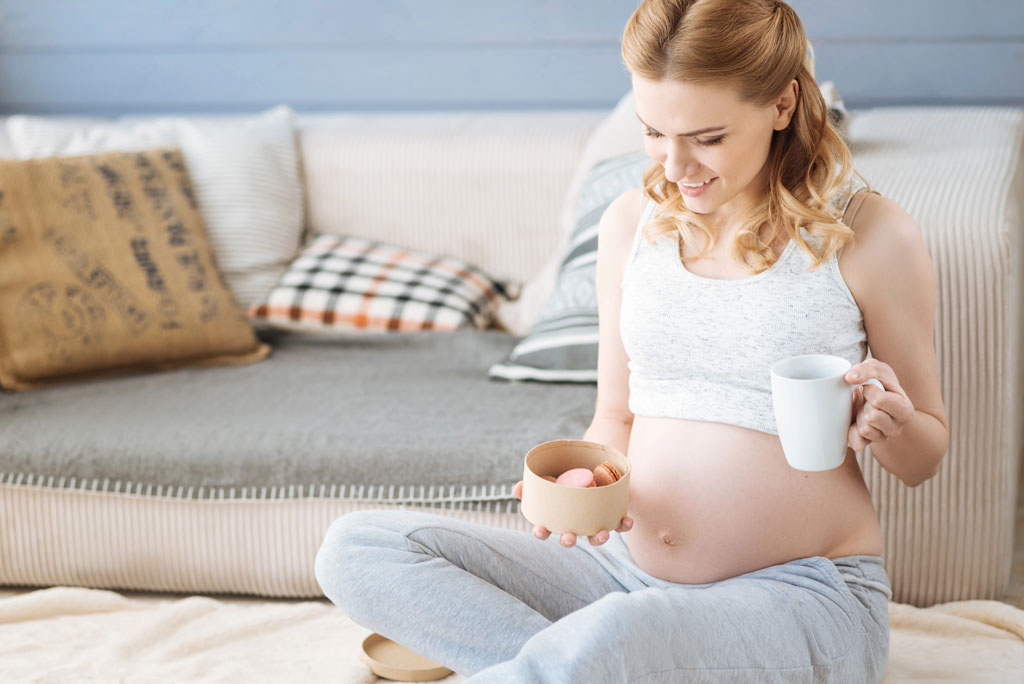Can Fibroids Affect My Pregnancy?
Published on 12/23/20
Fibroids are small – normally benign – tumors that grow from the muscle tissue in the uterus. They can range in size from a grapefruit to a pea. They can grow in multiple places from inside the uterine cavity, outside or inside the uterine wall. It is common to have many women with multiple fibroids of various sizes.
Around 40% to 60% of women have fibroids by the age 35, and 50% by the age 50. However, when it comes to pregnancy, detecting them can be more difficult. Because the woman’s uterus muscles thicken during pregnancy, it can be hard for doctors to tell if fibroids have formed.
Most women who develop fibroids during pregnancy go on to have normal pregnancies. But it’s possible that they can be the cause of some challenges; some significant in rare cases. Depending on the position and size of the fibroids, these are some of the factors that can determine how significant a fibroid is during pregnancy.
Issues during pregnancy
If fibroids are found to be present during pregnancy, it can cause a number of issues within development of the baby or cause a difficult labor.
Fibroids mean premature labor becomes a risk and possible pain during pregnancy. If the fibroids end up blocking the vagina, a caesarean section, or C-section, may be necessary for delivery. In other rare cases, fibroids can cause a miscarriage during the first 23 weeks of pregnancy.
It’s good to talk to your doctor to ensure there is no fibroid development, and if there is, your healthcare provider can give you further information and advice on how to handle them if you are pregnant.
Infertility
Infertility is the inability to become pregnant. Where fibroids are present, large fibroids can make a woman infertile. Fibroids can prevent fertilized eggs from attaching itself to the lining of the womb or prevent the sperm from reaching the egg. However, this doesn’t happen often.
If a woman develops a submucosal fibroid, it can block the fallopian tube which makes it harder to become pregnant.
How Fibroids Affect Each Pregnancy
Most women don’t have to worry about experiencing any fibroid complications. However, studies show that 10-30% develop complications due to fibroids. These can be:
- include pain (most common)
- vaginal bleeding
- spontaneous miscarriage
- preterm labor
- placenta abruption
- cesarean delivery
- postpartum hemorrhage
Not only does it include an increased risk for complications but some of these side effects can be worsened. Pain and inconvenient symptoms from fibroids can grow during pregnancy due to the influx of extra hormones. Fibroids need estrogen to grow.
1st Trimester
The first trimester is already met with morning sickness but is also the most common time period for fibroids to develop. During these first 12 weeks, about ⅓ of pregnant women grow fibroids.
Complications during the first trimester may include:
- Pain: Throughout pregnancy, pain is the most common issue caused by fibroids, and may occur in the pelvis, abdomen, lower back, hip, or down the leg.
- Vaginal Bleeding: Although spotting during early pregnancy is common and often harmless, any bleeding can be alarming. If you experience any, we recommend contacting your doctor immediately. During research, out of 4500 women, 59% just had pain, 30% had both bleeding and pain, and 11% had bleeding.
- Early Miscarriage: Of concern, early miscarriage rates are approximately double –– occurring in 14% of pregnancies for women with fibroids vs. 7.6% for women without them. Multiple fibroids, as opposed to large individual ones, appear to increase this possibility.
2nd and 3rd Trimesters
During these trimesters, your uterus expands so your baby can grow. Unlike the first trimester, fibroid growth is very seldom. However, if there happens to be fibroid development during the 2nd or 3rd trimester, facing complications are still possible. These could be anything from:
Preterm Labor: “Any birth contractions that begin before 37 weeks gestation are considered preterm labor. Symptoms can include changes in vaginal discharge, pelvic pressure, back pain, abdominal cramps, and contractions. In addition, your water can break. Your doctor may try to stop or slow down preterm labor with the use of medication. Although some preterm babies go on to have healthy lives, others experience lifelong consequences.”
Pain: This is one of the most common symptoms. If the fibroids become large they possibly twist. This can cause discomfort – specifically cramping. In other times, the fibroid dies after it outgrows its blood supply . This is called “red degeneration” and can cause severe stomach pains. And in some cases, miscarriage. Although it’s avoided, treatment for fibroids can ease the pain. Tylenol is normally recommended but over-the-counter medicines like ibuprofen are avoided because it can cause problems with gestation. It could cause a reduced amount of amniotic fluid and cause you to miscarry or cause heart problems in your baby.
Fibroid Pain During Pregnancy: “Pain is the most common symptom reported during the second and third trimesters, and is often experienced with large fibroids that are over five centimeters. Although rare, severe pain can also occur in cases of red degeneration. This process typically involves the torsion of a thyroid stalk (pedunculated fibroid). Symptoms include acute pain, fever, and abdominal tenderness.”
Fetal Growth Restriction: “This refers to a fetus who doesn’t grow at a normal rate within the womb. When born, the baby may have a low birth weight, low Apgar scores, meconium aspiration, decreased oxygen levels, low blood sugar, or a variety of other health challenges. Your doctor will take fundal measurements at each prenatal visit to help detect any growth abnormalities.”
Placental Abruption: “This condition occurs when the placenta partially or completely separates from the uterus before childbirth –– putting both the mother and baby at risk. Data suggests that women with fibroids are three times more likely to experience placental abruption than women without fibroids. Symptoms include vaginal bleeding, abdominal pain, back pain, uterine tenderness, and contractions. If you are experiencing any of these, please seek emergency care.” Placental abruption is deemed very serious because of the lack of oxygen that your baby receives. This can cause heavy bleeding and cause the mother to go into shock.
Postpartum
Fibroids can cause an increased risk during delivery, but is also known to create issues even after delivery.
- During Delivery: Studies indicate that the odds of a woman with fibroids having a C-section are up to six times greater than for a woman without fibroids. Uterine fibroids can prevent contractions, block the birth canal, or lead to a breech position. Babies born via C-section can experience both short and long-term health problems.
- For a breech birth creating another potential problem, the baby wants to come out of the birth canal butt or feet first versus head first.
- After Delivery: Postpartum hemorrhage –– more bleeding than normal after delivery –– is another potential complication that individuals with fibroids are significantly more likely to experience.
- Fibroids are known to shrink after pregnancy, and in some studies, 70% of women who had live births saw their fibroids shrink more than 50% 3 to 6 months after delivery.
- Beyond Delivery: You may be wondering what happens to symptomatic fibroids after your baby is born. The good news is that fibroids often shrink at this point –– though unfortunately for some, this isn’t always the case. If you continue to suffer from fibroid symptoms after giving birth, it’s important to alert a fibroid specialist.
Treatment For Pregnant Women With Fibroids
For most pregnant women, treating fibroids is generally avoided. However, there are natural treatments that healthcare providers can recommend so momma-to-be doesn’t have to suffer during the entire nine months of pregnancy. To help manage symptoms, healthcare providers may suggest:
- Apply a warm water bottle to painful areas
- Exercise to increase your body’s natural painkiller, endorphins
- Take warm baths
- Eat a healthy diet with plenty of fiber and beta carotene-rich foods
- Manage your blood pressure
- Reduce stress through relaxation techniques like yoga, massage, meditation and Tai chi
- Drink plenty of water
- Avoid alcohol and smoking
Uterine Fibroid Embolization
Some healthcare providers offer a procedure called Uterine Fibroid Embolization (UFE) – a minimally invasive, outpatient procedure that involves less risk and a significantly shorter recovery time than fibroid surgery. If you think you are suffering from symptomatic fibroids, talk to your doctor about your concerns. Your doctor may suggest the UFE procedure if they believe you are a good candidate.
Talk To Your Healthcare Provider
If you are still concerned about your pregnancy and possible fibroid development. Discuss your concerns with your doctor or a fibroid specialist. It is critical to understand the increased risks involved for you and your baby if you have detectable fibroids. Just being aware of the signs can help let you know when to seek medical attention and possibly save yourself from future complications.
This also means that if your fibroid symptoms don’t reverse naturally over time, after pregnancy, it is encouraged to call your doctor for a consultation and get you back on track, fibroid and symptom free.
Make sure you are always under the care of a medical professional. If you develop complications via a uterine fibroid, it’ll be worth it to have a doctor keep an eye on you and the development of your baby. Maintain good health and use potential signs of trouble to avoid complications in the future. The key is early intervention!
If You Think You May Be Suffering From Fibroids During Pregnancy, Call Rosh MFM
Uterine fibroids represent the most common gynecologic tumors, affecting about 20-50% of women of reproductive age.
These uterine growths can produce pain and heavy bleeding and may interfere with your ability to get pregnant. The doctors at Rosh Maternal & Fetal Medicine have years of experience treating fibroids, including using minimally-invasive surgery. If you have pelvic pain, please call their office in the Midtown East area of New York City, or schedule an appointment online.




